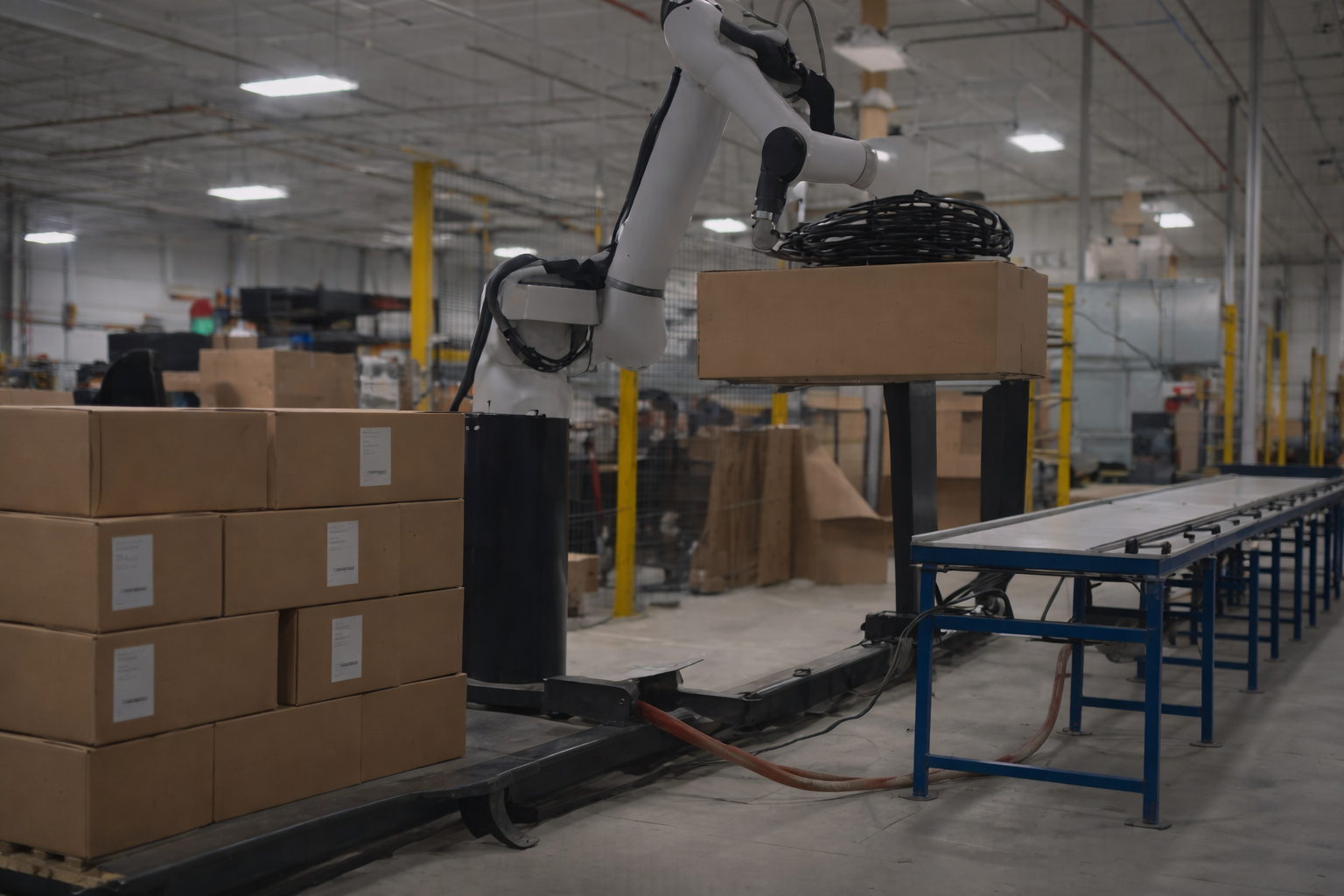Sustainability is increasingly becoming a priority for industries worldwide,. Manufacturing and packaging facilities are facing growing pressure to reduce their environmental impact. 87% of industry leaders agree that sustainability is growing in importance. Although intentions of sustainability are great, many operational sites lack an appropriate plan to reach their sustainability goals.
With energy efficiency, waste reduction, and streamlined operations at the forefront of innovation, AI-powered palletizing robots are emerging as a game-changing solution. Tutor Intelligence is paving the way for more eco-friendly automation by offering Robots as a Service (RaaS) models, which make these sustainable technologies accessible to businesses of all sizes.
Here, we explore how AI robotic palletizers reduce environmental impact while addressing critical challenges like labor shortages in the food manufacturing and packaging industry.
Reducing Energy Consumption in Warehouses
Warehouses and manufacturing facilities are known for their high energy demands, particularly in food and beverage packaging. Traditional palletizing systems often rely on energy-intensive equipment such as large motors, pneumatics, or hydraulics to move and stack heavy loads, which can significantly contribute to carbon emissions.
AI-powered palletizing robots, such as those offered by Tutor Intelligence, address this challenge by operating with minimal energy inputs. These robots require only Wi-Fi, power, and air to function, making them incredibly energy-efficient compared to older automation systems. By reducing energy consumption, manufacturers can lower their overall carbon footprint and make significant strides toward achieving sustainability goals.
The Role of AI Robots in Reducing Carbon Footprints
Transportation and logistics are among the largest contributors to greenhouse gas emissions in manufacturing. Palletizing robots optimize how products are stacked, creating stable and compact pallets that maximize truck space. This efficiency reduces the number of shipments required, directly cutting fuel consumption and emissions.
In food and beverage manufacturing, where distribution occurs at a massive scale, the environmental benefits of compact pallet configurations are particularly impactful. Fewer trips not only save costs but also reduce the industry's contribution to global carbon emissions.
Reducing Plastic Waste and Streamlining Waste Management
Plastic waste is a critical environmental issue, particularly in industries reliant on packaging. By improving stacking precision and reducing product damage, AI-powered palletizing robots help companies cut down on the use of excess packaging materials. This is especially valuable in food and beverage manufacturing, where secondary packaging materials like shrink wrap and protective layers can add up quickly.
Additionally, robots can be programmed to handle recyclable or reusable packaging more effectively than manual processes, further supporting waste reduction efforts. Palletizers often use end-effectors (or grippers) that handle packages with minimal contact and precision. Human workers may inadvertently damage reusable or recyclable packaging due to variability in grip strength, handling techniques, or fatigue. Palletizing robots can streamline waste management, ensuring more materials are diverted from landfills and into recycling systems.
Addressing Labor Shortages Sustainably
The ongoing labor shortage in manufacturing poses a significant challenge to the food industry, where production often relies on repetitive, labor-intensive tasks like palletizing. The shortage, which has left over 615,000 manufacturing jobs unfilled, forces businesses to adopt less efficient processes or overwork existing employees—both of which increase energy use and environmental strain.
AI-powered palletizing robots mitigate these challenges by automating physically demanding tasks, ensuring consistent production while reducing resource wastage caused by inefficiencies. By adopting Tutor Intelligence’s RaaS model, businesses can replace outdated methods with advanced automation without requiring a significant upfront investment, making sustainability more accessible even during labor crises.
Energy-Efficient Solutions for Sustainable Warehouses
Sustainability in warehouses goes beyond reducing emissions—it involves creating an ecosystem where every resource is optimized. Tutor Intelligence’s palletizing robots are designed to operate with maximum energy efficiency, requiring only essential inputs like electricity and air. This simplicity significantly reduces warehouse energy consumption, helping companies achieve their sustainability goals without compromising productivity.
Meeting Environmental Goals with AI Robotics
For companies striving to reduce their environmental impact, AI robotics offer an innovative path forward.
- Improved Sustainability in Food Packaging: By reducing energy consumption and minimizing waste, these robots help food manufacturers meet both operational and environmental objectives.
- Eco-Friendly Warehouse Automation: AI-powered systems create more sustainable workflows, reducing the need for energy-intensive processes and excessive packaging materials.
- Greener Manufacturing Processes: Regular software updates ensure that robots continually improve their energy efficiency and environmental performance over time.
Robots as a Service Pricing Models Are a Green Choice
Tutor Intelligence takes sustainability a step further with its Robots as a Service model. Unlike traditional automation systems, which require large upfront investments and ongoing maintenance costs, Tutor’s model allows businesses to pay per hour of use. This flexible approach ensures that companies can scale their operations without over-investing in unnecessary equipment, reducing waste and conserving resources.
Additionally, by handling all maintenance and software updates, Tutor ensures its robots remain energy-efficient and environmentally friendly throughout their lifecycle. This proactive approach minimizes downtime, extends equipment life, and prevents wasteful replacements.
A Sustainable Future for Manufacturing
As industries navigate the dual challenges of labor shortages and environmental responsibility, AI robotic palletizers are proving to be a solution that addresses both issues. By reducing energy use, optimizing logistics, cutting packaging waste, and supporting sustainable practices, these robots represent the future of eco-friendly automation in warehouses and manufacturing facilities.
For businesses in food and beverage manufacturing, where efficiency and sustainability are paramount, adopting AI palletizing robots is more than a smart decision—it’s a commitment to a greener, more resilient future. With Tutor Intelligence leading the way in accessible, sustainable automation, the path to achieving these goals has never been clearer.
Ready to make your operations more sustainable and efficient? Contact Tutor Intelligence today to learn how their energy-efficient palletizing robots can transform your business.



